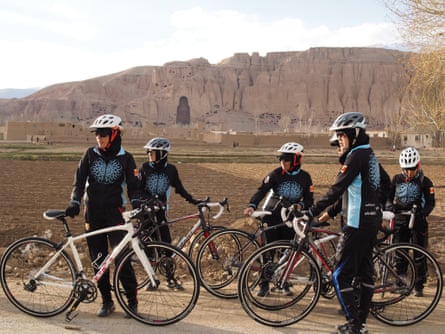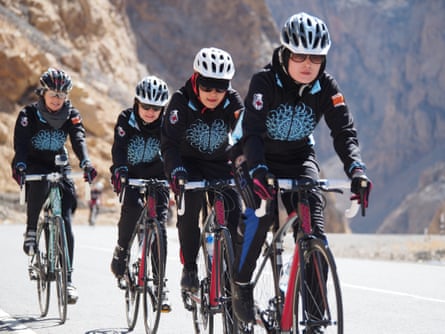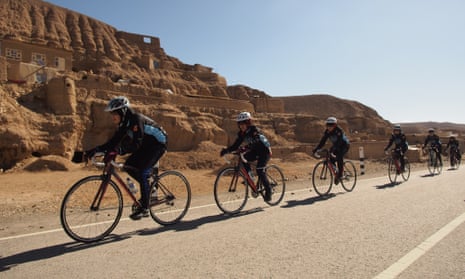Six mornings a week Zahra Alizada is on her bike long before 5am, slipping through the grey pre-dawn in a small pack of women savouring the brief peace on Kabul’s normally hectic, dusty streets.
Afghans rise early, and many of them are still scandalised to see a woman in sports kit speeding past on a racing bike. The Afghan women’s cycling team know this because, as the traffic swells towards the end of their morning training at around seven, men and boys start hurling insults and sometimes stones or chunks of rubbish at the women as they ride past.
“My sister encourages me,” says 16-year-old Alizada, one of the stars of the team, who juggles up to four hours training a day with school. “If a women just walks down the street, people often harass her, so if you go out on a bike they will certainly bother you. You just have to not let yourself care about it.”
So the women get up earlier than everyone else in summer and winter, and train after dark in the fasting month of Ramadan, racing around the empty roads of a half-finished housing development or straining up hills near a reservoir on the edge of town.
“These girls are challenging a big taboo in Afghanistan, riding a bicycle,” said Shannon Galpin, an American who is helping to train the team and, through her tiny charity Mountain2Mountain, has drummed up hundreds of thousands of dollars’ worth of equipment, sponsorship and publicity. She supports both male and female teams, but her work is inspired by the role of cycling in women’s rights movements worldwide, and her heart is clearly with the revolutionary girls. “Bikes equal freedom of movement and independent travel,” she says. “They are a cheap and accessible way for women to get to schools and hospitals, and they make it harder for men to attack them.”
Their hair is covered under helmets, but otherwise, in their loose tracksuits and trainers, they look much the same as the male team cycling beside them as unofficial guards.
“I’ve been fascinated by cycling since I was very young. I love the speed,” Alizada says. “Most of the time we exercise with the boys, to help make us braver, stronger. Sometimes when I’m with them, I feel like I’m not a girl.”
Driving them all is coach Abdul Sadiq, whose obsession with cycling began decades ago when he read about a lovelorn Afghan who cycled to India to woo a Bollywood star. Sadiq spent years chasing visas to make the same trip, which never happened. Instead he ended up as the country’s first, and for years only, professional cyclist.
“People call me the father of cycling here,” he says with a grin.
Sadiq has been trying to get Afghan women on bikes for decades, a project interrupted by the Taliban but restarted with his own daughter as soon as the hardline government was toppled.
Under communist rule, women often cycled to school or work, and his club had more female cyclists than men, but when civil war swept into the city he was forced to shut it down for the women’s safety. “There was one mujahideen commander who was like a wild animal from a jungle. He was very surprised to see that girls could bike, and every day we trained he would come and stare at us,” Sadiq said.

“I called all my students to the club and said the women can no longer train because of the security situation. The girls started crying, and for me it is one of my saddest memories.”
Years of conservatism have left their mark, and the women’s team today is a tiny, if determined, band: 15 cyclists in total, and just six of them on the national team. Most of the others are novices. “Years ago it was easy to persuade parents to let their daughters cycle; now I have hundreds of cases where the women want to cycle but their family refuses. One girl even lay down crying at her father’s feet, but he still would not let her.”
Many families say they worry as much about safety as their daughters’ reputations. In a country where girls have faced acid attacks just for going to school, the dangers of doing sport in public go beyond insults or the momentary impact of a well-aimed stone. Last year one of the riders was slammed off the road and her bike by a man on a motorbike, and spent nearly a week in hospital and a month recovering.
In September, as the summer heat waned but Afghanistan was filled with political tension waiting for the results of fraud-riddled elections, Sadiq also ended up in hospital after an attack.
“Coach and myself have been getting threats. It seems in this case that one of the threats was real,” Galpin said dryly. But he, the Alizada sisters and the rest of the team are back to training undeterred, their hopes fixed on the 2016 Olympics and a quiet revolution at home.
The first international appearance by a female Afghan cyclist was only three years ago. They have yet to win any medals – or even finish some of the tougher races – but that is only pushing them to train harder.
“These girls are not competitive,” Galpin admits. “Many have only started riding in the past couple of years. They do not always finish the longer races, but they are winning every time they line up at international competitions, changing the face of the sport and showing the determination and bravery of Afghan women.”


Comments (…)
Sign in or create your Guardian account to join the discussion